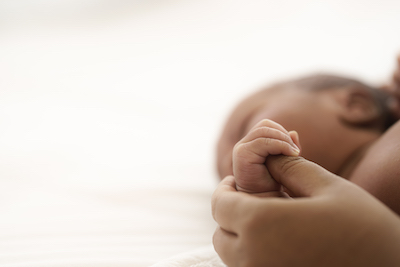Giving birth is supposed to be a happy experience, but for some women it can be anything but. Recent studies have shown that as many as 1 in 3 women who give birth may suffer from post-traumatic stress disorder (PTSD). This number may even be higher if you include women who do not report their symptoms. Birth trauma can be extremely damaging and can leave lasting scars on both the mother and her child. In this blog post, we will discuss the causes of birth trauma PTSD, its symptoms, and how best to seek help.
Contents
Understanding Birth Trauma PTSD
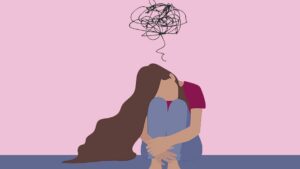
Birth trauma PTSD is a type of post-traumatic stress disorder that can occur after a woman gives birth. This type of trauma can occur during any type of birth, whether it is a vaginal delivery or a cesarean section. It involves a range of emotions, from fear and anxiety to rage and despair. Birth trauma can also lead to physical symptoms such as headaches, chest pain, and difficulty breathing. In some cases, it can even result in postpartum depression.
It is important to note that post-birth PTSD is not the same thing as the baby blues. Baby blues is a normal and common condition that affects up to 80% of new mothers. It is characterized by mood swings, crying spells, anxiety, and fatigue. These symptoms usually resolve within two weeks after delivery. Birth trauma PTSD, on the other hand, can last for months or even years if left untreated.
Causes
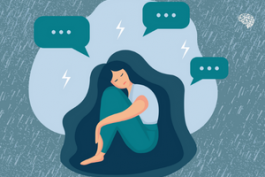
There are many factors that can contribute to the development of birth trauma PTSD.
- One major factor is the type of delivery you had. If you experienced any complications during childbirth, such as prolonged labor or an emergency cesarean section, you may be more likely to develop this condition.
- Another risk factor can be the way you were treated by your doctor during childbirth. If you felt like your medical staff, midwife or others present with you during birth were not listening to your concerns, this can also lead to birth trauma PTSD.
- Lack of familial support can also be a major contributing factor. If you did not have the support of your partner or family during childbirth, this can leave you feeling isolated and alone.
- Additionally, if you have a history of trauma or mental illness, you may also be at greater risk for developing birth trauma PTSD. This can include things like sexual abuse, domestic violence, or previous trauma during childbirth.
- In the unfortunate events that some women have to face, such as the death of a child during childbirth, the risk of developing PTSD is even higher. This is due to the fact that these women often feel guilty, even though it was not their fault.
- Childbirth is also a time of great hormonal changes. These changes can lead to a temporary decrease in your ability to cope with stress. This can make you more vulnerable to developing PTSD after childbirth.
- Lastly, any type of physical injury during childbirth can also contribute to the development of this condition. This includes things like vaginal tearing, episiotomies, or even just the general discomfort of labor.
Symptoms
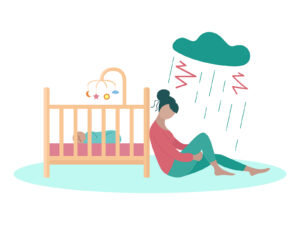
PTSD can cause a range of physical, emotional, and behavioral symptoms. Some common symptoms include:
Physical signs:
- Headaches
- Chest pain
- Stomach problems
- Problems sleeping
- Fatigue
Emotional signs:
- Anxiety
- Depression
- Intrusive thoughts
- Guilt
- Fearfulness
Behavioral signs:
- Avoidance of people or places associated with the trauma
- Flashbacks
- Nightmares
- Withdrawal from friends and family
- Avoiding talking about anything related to the birth or pregnancy
- Loss of interest in activities you used to enjoy
- Difficulty bonding with your baby
- Hypervigilance
- Irritability
- Angry outbursts
These are a few of the more common symptoms, but it is important to remember that everyone experiences PTSD differently. Symptoms can also differ on the basis of intensity, frequency, as well as duration.
If you are experiencing any of these symptoms, it is important to seek help from a mental health professional. PTSD can be a very debilitating condition, but there are treatment options available. With proper care and support, you can begin to heal the trauma and start living your life again.
Effects On Life
Birth trauma PTSD is not just about the trauma that occurs during the childbirth process. It has longing effects that can touch every part of your life.
On The Mother
The woman who went through the birthing process is undoubtedly the most effected person by this disorder.
- The first and most obvious way that birth trauma PTSD can affect your life is by causing problems in your relationship with your partner. The emotional upheaval that accompanies this condition can lead to arguments, distance, and even divorce. It is important to seek couples counseling if you are experiencing any difficulty in your relationship.
- This condition can also have a major effect on your ability to bond with your child. If you are struggling with intrusive thoughts or flashbacks, it can be very difficult to focus on the present moment and enjoy time with your baby. This can lead to feelings of guilt and isolation.
- Additionally, birth trauma PTSD can cause difficulties at work. If you are having trouble concentrating or if you are constantly on edge, it can be very difficult to perform your job duties. This can lead to problems with your employer and may even cause you to lose your job.
- Lastly, birth trauma PTSD can have a major effect on your overall mental health. It may also lead to neglect in self-care, which may also lead to physical health problems. If left untreated, this condition can lead to depression, anxiety, and even suicidal thoughts.
On The Baby
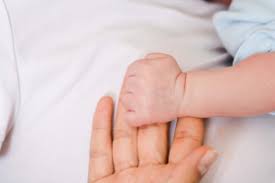
It is important to remember that birth trauma PTSD does not just affect the mother. It can also have a major effect on the baby.
- One of the most common effects is difficulty bonding. If the mother is struggling with intrusive thoughts or flashbacks, she may have trouble focusing on the present moment and enjoying time with her baby. This can lead to feelings of guilt and isolation.
- Additionally, birth trauma PTSD can cause problems with breastfeeding. If the mother is constantly on edge or struggling with intrusive thoughts, she may have trouble producing enough milk. This can lead to problems with weight gain and may even cause the baby to be born early.
- The impact of PTSD on the baby’s life can also come off as the baby acting “different.” The baby may be more irritable or have difficulty sleeping. Additionally, the baby may startle easily or have a hard time bonding with other people.
All of these effects lead to a significant loss in quality of life. It can cause you to lose your job, your home, and even your family. It can also result in huge disturbances in the baby’s nurturing. Birth trauma PTSD is a serious condition that should not be taken lightly. If you are a mother struggling with post-birth trauma, it is important to seek help from a mental health professional. There are many resources out there to support you on your journey to recovery. You are not alone.
Diagnosis
The official diagnosis for birth trauma PTSD is called perinatal post-traumatic stress disorder, or PPSTD.
To be diagnosed with this condition, you must have experienced a traumatic event during the perinatal period. This includes the time from conception to one year after delivery.
In addition, you must also experience symptoms from at least four of the following five categories:
- Flashbacks: You may have flashbacks of the event, which can range from mild to severe. These may be triggered by people, places, or things that remind you of the trauma.
- Intrusion: This includes unwanted and intrusive thoughts, images, memories, or dreams related to the birth trauma. You may also have flashbacks where you feel like you are reliving the event.
- Avoidance: This involves avoiding people, places, activities, or thoughts that remind you of the birth trauma. You may also avoid talking about the event altogether.
- Arousal and reactivity: This includes feeling on edge, being easily startled, having difficulty sleeping, and outbursts of anger. You may also find yourself hypervigilant and always on the lookout for danger.
- Cognition and mood: This includes negative changes in your thinking or mood that are directly related to the birth trauma. You may feel like you are detached from yourself or the world around you. You may also have trouble remembering aspects of the event.
A clinical diagnosis can only be made by a mental health professional. If you think you may be struggling with birth trauma PTSD, it is important to seek help from a qualified therapist such as a psychiatrist or clinical psychologist.
If you are experiencing these symptoms and they are causing significant distress or impairment in your life, you may be diagnosed with birth trauma PTSD.
Treatment Options
If you are struggling with birth trauma PTSD, there are many treatment options available to help you on your road to recovery.
Therapy
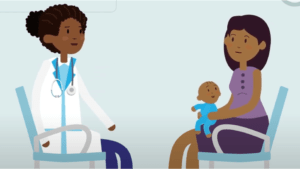
Therapy is the process of talking with a mental health professional to help you understand and work through your experiences. There are many different types of therapy, but some common ones used to treat birth trauma PTSD include:
- Cognitive behavioral therapy: This type of therapy helps you identify and change negative thinking patterns that may be contributing to your symptoms.
- Exposure therapy: This type of therapy involves gradually exposing yourself to people, places, or things that trigger your symptoms. This can help you learn to cope with these triggers in a healthy way.
- Dialectical behavior therapy: This type of therapy focuses on helping you develop skills like mindfulness and emotional regulation. These skills can help you better manage your symptoms.
- Couples counseling: Like we already know, post-birth trauma also has effects on the baby’s nurturing. This can put a strain on your relationship. Couples counseling can help you and your partner develop healthy communication and conflict-resolution skills.
- Support groups: There are many online and in-person support groups available for mothers struggling with post-birth trauma. These groups provide a space for you to share your experiences and connect with others who understand what you’re going through.
Medication
In some cases, medication may also be used to treat birth trauma PTSD. Medication can help reduce symptoms like anxiety, depression, and insomnia.
Some common types of medication used to treat birth trauma PTSD include:
- Antidepressants: These medications can help reduce symptoms of depression, anxiety, and irritability.
- Anti-anxiety medications: These medications can help reduce symptoms of anxiety and insomnia.
- Sleep medications: These medications can help you get the rest you need to heal and cope with your symptoms.
Medications during immediate post-birth can be tricky and have certain side effects. It can also impact the mother’s ability to breastfeed. So, always consult with a doctor before starting any medication.
Self Care Strategies
Just like with any other mental or emotional issue, there are a lot of ways you can care for yourself if you’re struggling with birth trauma PTSD.
Here are some self-care tips:
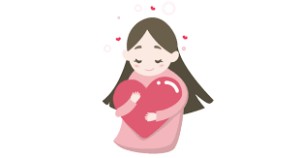
- Hire some help: It is okay to ask for help with things like childcare, housework, and cooking. This can help reduce your stress levels and give you more time to focus on your recovery.
- Practice affirmations: Positive affirmations are statements that you repeat to yourself to help change your thinking patterns. For example, you could say “I am a good mother” or “I am capable of handling this.”
- Accept the reality: One of the most important things you can do for yourself is to accept that what happened was real. It is okay to feel scared, sad, and angry about what happened.
- Be patient with yourself: Recovery from birth trauma PTSD takes time. Be patient with yourself and don’t expect to see results overnight. Consistency and patience are key.
- Let go of self-blame: It is important to remember that you are not responsible for what happened. Birth trauma is not your fault. Talking to someone who understands what you’re going through can be extremely helpful. This could be a therapist, support group, or close friend or family member.
- Take breaks: When you’re feeling overwhelmed, take a few minutes to yourself to relax and recharge. Take a hot bath, read your favorite book, or take a walk outside.
- Get enough sleep: Sleep is essential for healing and coping with stress. Make sure to get at least seven to eight hours of sleep each night.
- Eat a healthy diet: Eating a nutritious diet will help your body to heal and cope with stress. Make sure to eat plenty of fruits, vegetables, and whole grains.
- Exercise: Exercise releases endorphins, which have mood-boosting effects. Even just a moderate amount of exercise can help improve your symptoms.
- Journal: Journaling is one of the most effective ways to process your thoughts and emotions. It can also help you to track your progress and see how far you’ve come.
- Find a creative outlet: Creativity can be a great way to express yourself and relieve stress. Some creative outlets you could try include painting, writing, photography, and scrapbooking.
Lastly, it is extremely important to cherish the experiences of being a new mother. Despite the emotional difficulties, remember to take time to enjoy your new baby. These moments are precious and will not last forever.
If you or someone you know is struggling with birth trauma PTSD, please reach out for help. There are many resources available to those who need it. You are not alone.
Conclusion
Birth trauma PTSD is a serious condition that can have a profound effect on your life. If you think you may be struggling with birth trauma PTSD, reach out to a mental health professional for help. With treatment, you can begin to heal the effects of this trauma and live a healthy and happy life.
If you or someone you know is struggling with PTSD symptoms or any type of mental health issues, you can reach out to Mantra Care for help. We have a team of expert mental health professionals offering psychological assistance for your best interests. Our services are available at pocket-friendly rates from all across the world with assured effectiveness and privacy. You can visit our website to book a session or download our free Android or iOS app for more information!
